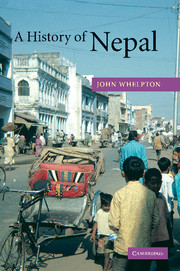Book contents
- Frontmatter
- Contents
- List of illustrations
- List of maps
- List of tables
- Key events
- Acknowledgements
- Notes on romanisation and terminology
- List of abbreviations
- Introduction
- 1 Environment, state and society in the central Himalayas to 1743
- 2 Unification and sanskritisation, 1743 – 1885
- 3 Nepal under the Shamsher Ranas, 1885 – 1951
- 4 The monarchy in ascendance: domestic politics and foreign relations, 1951 – 1991
- 5 The quest for ‘development’: economy and environment, 1951 – 1991
- 6 Lifestyles, values, identities: changes in Nepalese society, 1951 – 1991
- 7 Democracy and disillusionment: Nepal since 1991
- Genealogical tables
- Biographical notes
- Notes
- Glossary
- Bibliography
- Index
6 - Lifestyles, values, identities: changes in Nepalese society, 1951 – 1991
Published online by Cambridge University Press: 05 June 2016
- Frontmatter
- Contents
- List of illustrations
- List of maps
- List of tables
- Key events
- Acknowledgements
- Notes on romanisation and terminology
- List of abbreviations
- Introduction
- 1 Environment, state and society in the central Himalayas to 1743
- 2 Unification and sanskritisation, 1743 – 1885
- 3 Nepal under the Shamsher Ranas, 1885 – 1951
- 4 The monarchy in ascendance: domestic politics and foreign relations, 1951 – 1991
- 5 The quest for ‘development’: economy and environment, 1951 – 1991
- 6 Lifestyles, values, identities: changes in Nepalese society, 1951 – 1991
- 7 Democracy and disillusionment: Nepal since 1991
- Genealogical tables
- Biographical notes
- Notes
- Glossary
- Bibliography
- Index
Summary
Although hopes for the rapid economic transformation of Nepal after 1951 were not realised, there were nevertheless profound and far-reaching changes in Nepalese society. The expansion of the education system and the improvements in communication between different regions of the country and between Nepal and the outside world meant that the outlook and expectations of Nepalese, and particularly young Nepalese, were very different in 1990 from what they had been forty years previously. The gap between expectations and achievements was perhaps the single most important factor that brought the Panchayat system to its knees in 1990 and then drove the system that replaced it into crisis.
TOWN AND COUNTRY
The transformation naturally went further and faster in urban centres and areas of the countryside within easy reach of them. Above all, they affected the Kathmandu Valley, which was also where development in the economic sense was most successful, but very similar changes affected other towns also, especially Pokhara in the mid-western hills and urban centres in the Tarai. Moreover, the divide between the towns and the hinterland, though real, was not an impermeable barrier and the influence of ideas that took hold in urban areas was felt in varying degrees across the whole country.
The clash between old and new in the capital after 1951 was symbolised from the beginning in the language used at the centre of power. Both the Ranas and the Shah kings had addressed their subjects as timi (equivalent to French tu or German du). Under the new democratic dispensation, commoners now expected tapain, the normal polite form between adults. Mohan Shamsher Rana found it particularly galling to have to treat the Newar minister Ganesh Man Singh in this way and got round the problem by speaking to him in English. Tribhuvan and Mahendra, though they had in effect inherited the Ranas’ autocratic powers, were happy to use tapain but King Birendra, who unlike his father and grandfather received a modern education abroad, seemed to prefer timi, even when speaking to Brahmans. When aware that this might cause offence he followed Mohan's strategy by using English or impersonal expressions.
- Type
- Chapter
- Information
- A History of Nepal , pp. 154 - 188Publisher: Cambridge University PressPrint publication year: 2005
- 1
- Cited by



